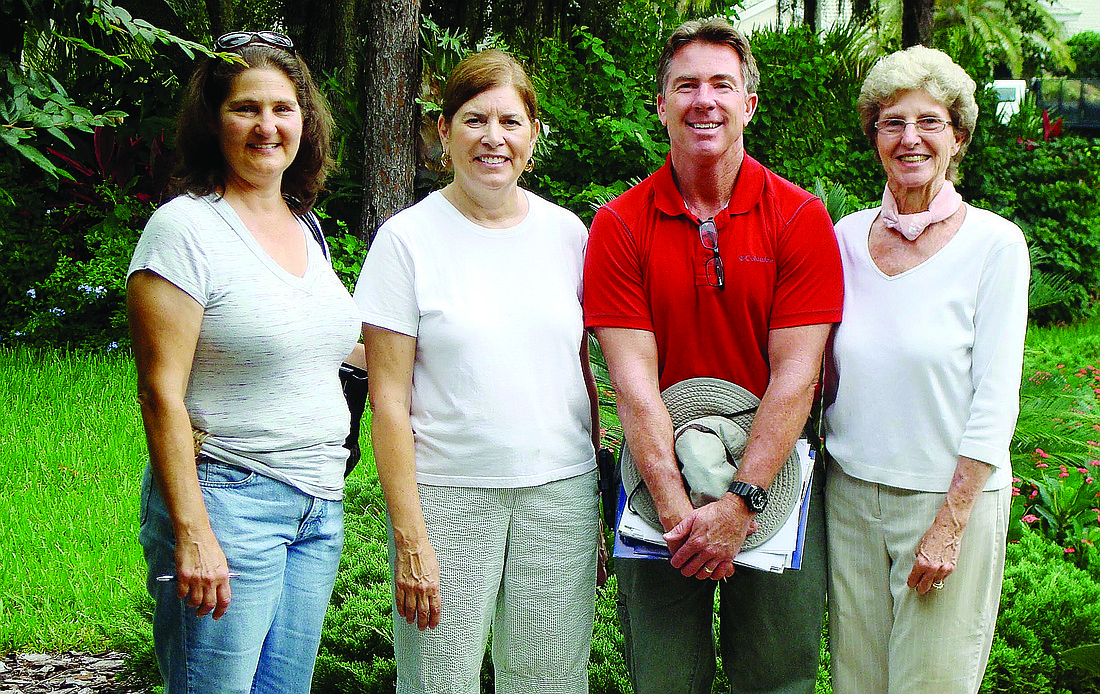- October 23, 2024
-
-
Loading

Loading

UNIVERSITY PARK — When Rosemary DePaolo and her husband, Fred Wharton, moved in to University Park’s Henley neighborhood, the couple knew it wanted to relandscape the backyard.
But the encouragement of their neighbor, Polly Curran, to choose Florida-friendly plants and design helped shape their plans.
“It made sense to go with a Florida-friendly approach,” DePaolo said. “It was much easier to maintain, and it’s quite beautiful. That, to us, seemed to be the best combination. We had the color we wanted. It’s a lovely space.”
Now, every home in the community has been reviewed for Florida-friendly criteria, and 30 of 32 homes have earned Florida-friendly distinction through the University of Florida-sponsored Florida Friendly Landscape program offered through Manatee County Extension Services.
“It’s good for the environment,” Curran said. “It’s healthy for the landscape. It’s being a sort of protector of the environment.”
Curran and neighbors Emily Vosnos and Maureen Hager began their Florida-friendly initiative two-and-a-half years ago. They led efforts to have the Henley community’s common areas designated as Florida-friendly in March 2012. Since that time, they have spoken with owners of each of the community’s 32 homes in an effort to have each maintenance-free property become certified as Florida-friendly.
Curran’s neighbors, Candice and Jeffrey Caufield, received the neighborhood’s lone gold-standard certification, while 29 homes have earned silver designations. Only two — of which one is for sale — are not yet Florida-friendly certified. To receive a gold-standard certificate, the Caufields’ home achieved the standards for every one of the Florida-friendly checklist items (see sidebar).
The project is a contender for the 2014 “Keep Manatee Beautiful” awards for landscaping image for neighborhood communities, which will be announced at a dinner banquet Sept. 18, at the Polo Grill and Bar.
Curran attributes the success to homeowners’ willingness to implement Florida-friendly practices, as well as working with landscape contractor Biological Tree Services, a sustainable landscape provider. It uses alternative products, such as mycorrhizal fungi and soil microbes and bacteria, to promote plant health.
Even with the certification, homeowners in Henley must continue their Florida-friendly efforts, keeping invasive species, such as Brazilian peppers, from encroaching onto their properties.
“We have a good thing going,” Curran said. “Let’s see if we can get the whole neighborhood (certified).”
Florida-Friendly Landscaping Program Checklist
The following practices are among those required for standard-level recognition:
Homeowner certifies that landscape complies with all codes, laws, ordinances and HOA rules, if applicable
Landscape does not contain any plants found on the current University of Florida/Institute of Food and Agricultural Sciences Assessment prohibited list
Landscape contains at least five species of plants
Grass clippings are left on the lawn after mowing and any spilled fertilizer is collected
Fertilizer is not applied when heavy rain is forecast within the next 24 hours
Fertilizer is applied to turf grass and landscape beds at less than or equal to the UF/IFAS-recommended rate
Volcano mulching is avoided; a 2-inch to 3-inch layer of one of a program-recommended mulch is maintained over tree roots, shrubs and plant beds, as appropriate
Roof runoff drains into landscaped areas or pervious surfaces
Irrigation system is calibrated to apply one-half to three-quarter inches of water per application
Spray and rotor heads are installed on separate zones
Defined landscape beds
Landscape matches aesthetic of community
Landscape and household debris is properly disposed of or recoiled
Gold-level prerequisites (must meet five practices in addition to above-listed criteria)
Landscape does not contain invasive species
Landscape contains at least 10 species of plants
A soil nutrient test has been performed
No high-volume irrigation is used on site
Landscape meets five of five aesthetic requirements
Then, homes are graded on criteria such as the following:
Landscape does not contain any invasive plant found on the UF/IFAS assessment list
Turfgrass is maintained for specific uses only (children, pets, recreation)
Groundcover is used to prevent erosion
Low-flow irrigation is installed and maintained in plant and flower beds (in yards with irrigation systems)
A broadcast spreader with an operational deflector shield is used to apply fertilizer
Self-mulching areas exist under trees where leaves can remain as they fall
Landscape is checked every one to two weeks for signs of pest damage
A water source for wildlife exists in the landscape
Porous surfaces are used for walkways, patios and driveways
Rainwater is collected in a rain barrel or cistern and used to water plants
A compost pile is maintained with grass clippings, leaves, pruned plant parts and kitchen scraps
Florida-friendly principles
•Water efficiently
•Fertilize appropriately
•Mulch to control weeds and retain soil moisture
•Attract wildlife
•Manage yard pests responsibly
•Recycle
•Reduce stormwater runoff
•Protect the waterfront
•Right plant for th
What is a Florida-friendly landscape?
A Florida-friendly landscape is one that uses native, low-maintenance plants combined with environmentally sustainable landscaping practices.
To learn more, visit manatee.ifas.ufl.edu
Contact Pam Eubanks at [email protected].